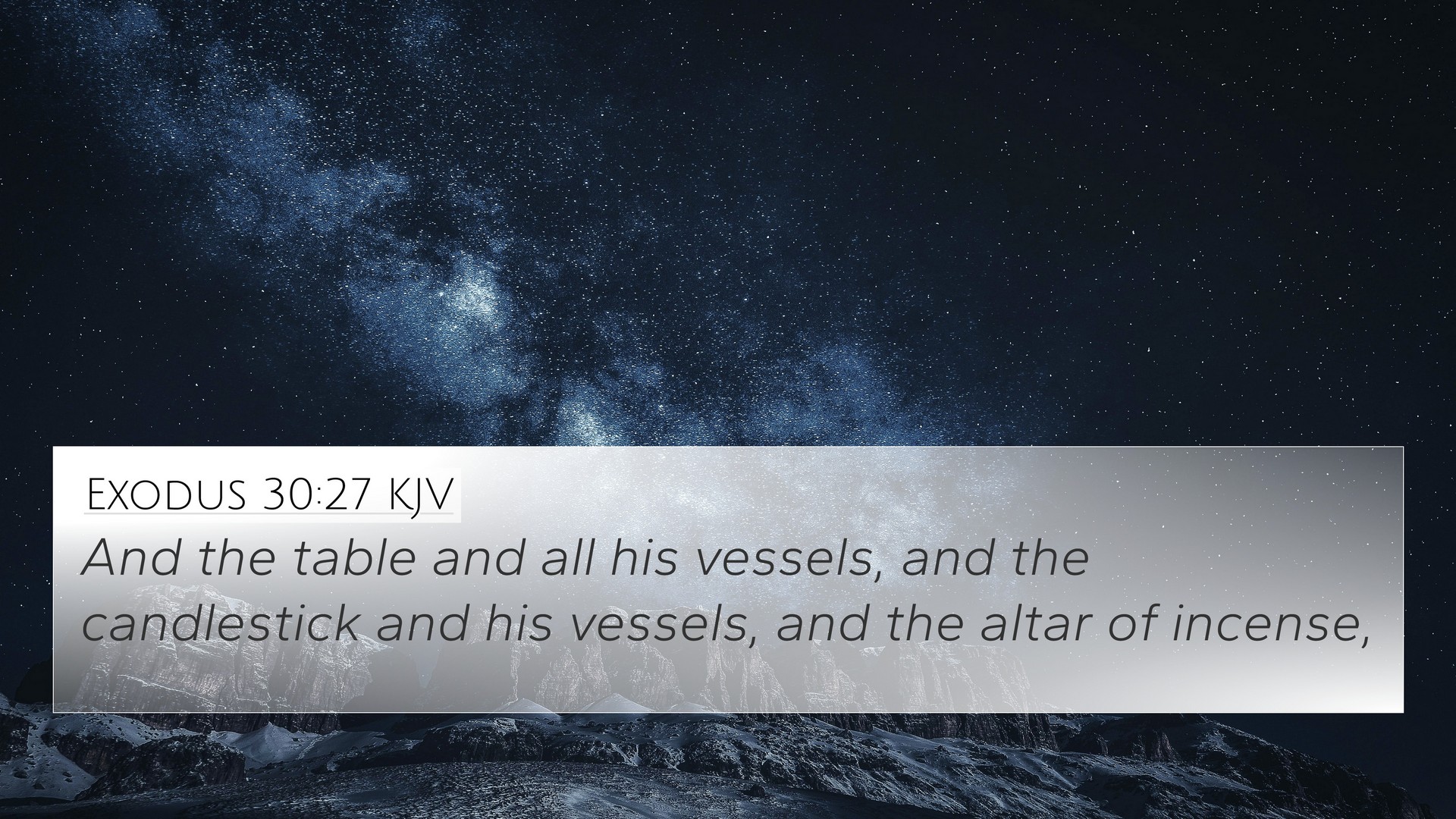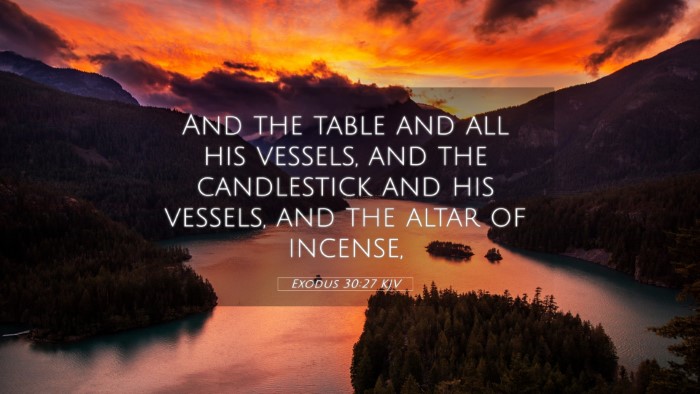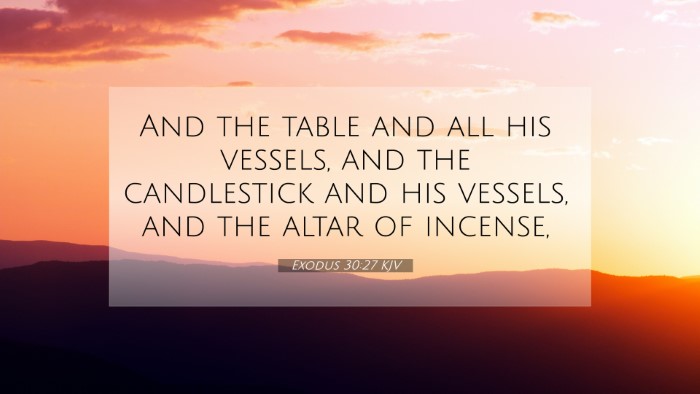Understanding Exodus 30:27
Exodus 30:27 is a significant verse within the context of the Old Testament, specifically regarding the instructions provided for the sacred anointing oil. This verse highlights the meticulous nature of the tabernacle services and the importance of consecrated items used in worship. Below is a detailed exploration of this verse, encapsulating insights gathered from renowned commentaries.
Verse Text
Exodus 30:27 (KJV): “And the table and all his vessels, and the candlestick and his vessels, and the altar of incense.”
Commentary Insights
This section combines interpretations and explanations regarding Exodus 30:27 from various public domain commentaries.
Matthew Henry's Commentary
In his analysis, Matthew Henry emphasizes the symbolic significance of the items mentioned in this verse. He notes that the table represents God’s provision for His people, while the candlestick symbolizes the light of divine knowledge and revelation. The altar of incense reflects the prayers of the saints rising to God. Each item is treated with reverence, indicating the importance of holiness in worship.
Albert Barnes' Commentary
Albert Barnes focuses on the practical aspects of the verse, detailing the responsibilities of the priests in maintaining these sacred items. He explains that the anointing of the vessels signifies their dedication to God’s service and that improper use of holy things can lead to consequences. This reinforces the principle that God commands respect and honor in the worship practices established for His people.
Adam Clarke's Commentary
According to Adam Clarke, the purpose of anointing the vessels is to set them apart for a divine purpose. In his analysis, he points out that the anointing oil serves as a means of sanctification, demonstrating that everything used in the tabernacle is sacred. Clarke connects this principle to New Testament teachings about the believer’s life being a living sacrifice, dedicated to God’s glory.
Thematic Connections
The message in Exodus 30:27 is intertwined with numerous themes throughout the Bible, highlighting the sacredness of worship and the need for holiness. Here are some thematic connections and applicable Bible verses:
- Holiness in Worship: Leviticus 10:3 - "Then Moses said to Aaron, 'This is what the Lord spoke, saying: 'By those who come near Me, I will be treated as holy.'"
- Divine Provision: Philippians 4:19 - "And my God shall supply all your needs according to His riches in glory by Christ Jesus."
- Prayer as Incense: Revelation 5:8 - "And when He had taken the scroll, the four living creatures and the twenty-four elders fell down before the Lamb, each holding a harp, and golden bowls full of incense, which are the prayers of the saints."
- Light of the World: Matthew 5:14-16 - "You are the light of the world. A city set on a hill cannot be hidden..."
- Dedication to God: Romans 12:1 - "I urge you, brothers and sisters, in view of God’s mercy, to offer your bodies as a living sacrifice, holy and pleasing to God..."
- Setting Apart for Service: 1 Peter 2:9 - "But you are a chosen race, a royal priesthood, a holy nation, a people for His own possession..."
- The Role of Priests: Hebrews 5:1 - "For every high priest taken from among men is appointed for men in things pertaining to God..."
- Consecration for God's Use: 2 Timothy 2:21 - "Therefore if anyone cleanses himself from the latter, he will be a vessel for honor, sanctified and useful for the Master..."
- Cleansing and Sanctification: Psalms 51:7 - "Purge me with hyssop, and I shall be clean; wash me, and I shall be whiter than snow."
Practical Implications
The anointing of the vessels as outlined in Exodus 30:27 serves not only as an instruction for the Israelites but also as a poignant reminder for contemporary believers regarding the necessity of setting aside time and resources for God’s kingdom. The act of dedicating our efforts, time, and resources echoes the sacredness of worship described here.
Conclusion
Exodus 30:27 captures crucial aspects of worship and the divine requirement for holiness in conducting services. By cross-referencing related Bible verses, one can gather a deeper understanding of the continuity of God's expectation for holiness from the Old Testament through to the New Testament. This understanding enhances the believer's appreciation of Scriptural teachings and the overarching narrative of redemption and service to God.
Cross-Referencing Tools and Methods
For those looking to explore further, consider utilizing Bible reference resources or a Bible concordance. These tools enable the identification of connections between Bible verses, enhancing your study experience. Below are some suggestions:
- Bible Concordance: Useful for locating keywords and themes across the Scriptures.
- Cross-Reference Bible Study: Engage in systematic study by comparing related verses.
- Bible Chain References: Follow a chain of related verses to understand a particular theme or doctrine.
- Bible Cross-Reference Guide: Guides available can help you link passages thematically or contextually.
- Comprehensive Bible Cross-Reference Materials: These can aid in understanding broader Biblical narratives and connections.
Further Study
This analysis of Exodus 30:27 serves as a foundation for deeper exploration into the significance of holy items and the principles governing worship in both the Old and New Testaments. As you reflect on this verse, may you gain insight into the beautiful tapestry of God's revelation throughout Scripture.


